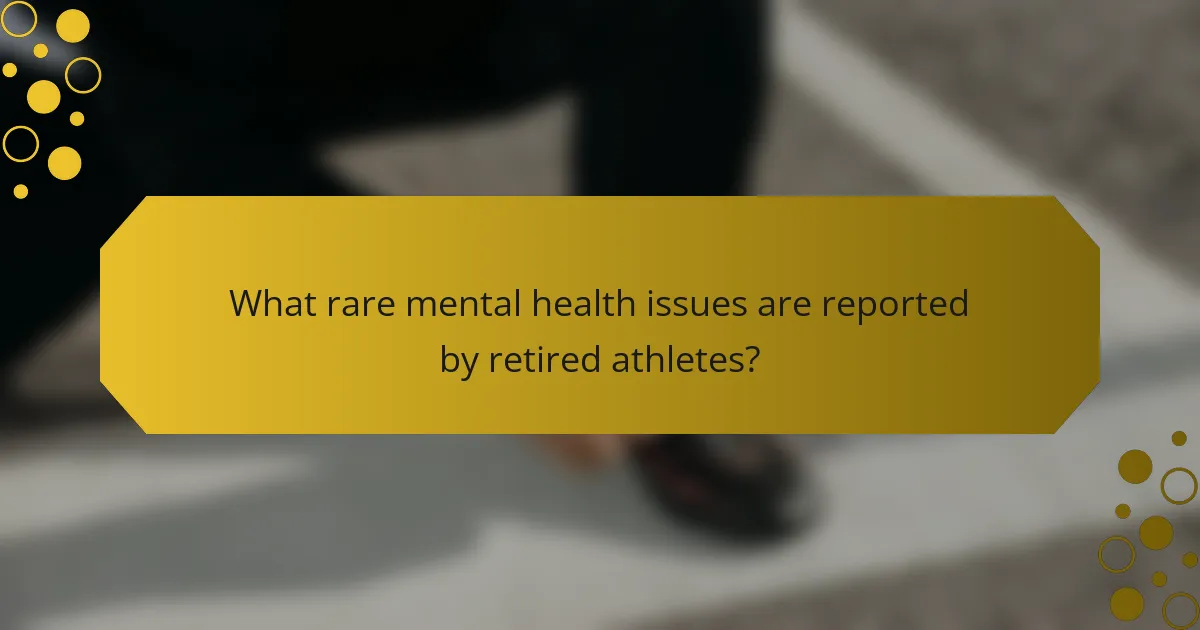Retired athletes often face mental health challenges, including identity loss and anxiety. Accessing tailored counseling services, support groups, and online platforms can provide essential emotional support. These resources foster community connections, enhance coping mechanisms, and promote overall mental resilience. Engaging with specialized programs can significantly improve the well-being of retired athletes navigating life after sports.

What are the primary mental health resources available for retired athletes?
Retired athletes can access various mental health resources, including counseling services, support groups, and online platforms. These resources help address issues like depression, anxiety, and identity loss after retirement.
Counseling services often provide tailored support for athletes transitioning to life after sports. Support groups create community connections, reducing feelings of isolation. Online platforms offer accessible information and virtual therapy options, catering to diverse needs.
The unique attribute of these resources is their specialization in athlete experiences, ensuring relevant and effective support. As a result, many retired athletes report improved mental well-being when utilizing these services.
How do these resources address common mental health challenges?
Mental health resources for retired athletes effectively address common challenges by offering tailored support systems. These resources provide access to counseling, peer support groups, and workshops focused on coping strategies. Such support can reduce feelings of isolation and anxiety, which are prevalent among retired athletes. Additionally, resources often emphasize physical wellness, as maintaining an active lifestyle can significantly improve mental health outcomes. Programs specifically designed for athletes help them transition from competitive sports to everyday life, addressing unique psychological needs.
What organizations focus on mental health support for retired athletes?
Organizations focusing on mental health support for retired athletes include the Professional Athletes Foundation, the NFL Player Care Foundation, and the Mental Health Foundation. These organizations provide resources, counseling, and programs tailored to the unique challenges faced by retired athletes. They aim to address issues such as depression, anxiety, and the transition to life after sports.
What services does the Professional Athletes Foundation offer?
The Professional Athletes Foundation offers mental health resources specifically designed for retired athletes. These services include counseling, support groups, and educational workshops focused on mental wellness. Additionally, they provide access to professional mental health specialists who understand the unique challenges faced by former athletes. The foundation emphasizes the importance of mental health and aims to foster a supportive community for those transitioning from professional sports.
How does the NFL Player Care Foundation assist former players?
The NFL Player Care Foundation provides mental health resources to assist former players through counseling services, support groups, and wellness programs. These initiatives address the unique challenges retired athletes face, including depression and anxiety. The foundation’s focus on mental well-being reflects a commitment to improving the quality of life for retired players. By offering tailored resources, the foundation helps former athletes navigate their transitions and maintain their mental health.
What role do peer support networks play in mental health recovery?
Peer support networks significantly enhance mental health recovery for retired athletes. They provide emotional support, shared experiences, and practical advice, fostering resilience and reducing feelings of isolation. Engaging with peers who understand similar challenges can lead to improved mental well-being and a stronger sense of community. Studies show that athletes involved in these networks report higher satisfaction in their recovery journeys.

What are the universal benefits of mental health resources for retired athletes?
Mental health resources offer retired athletes essential support for emotional well-being, coping mechanisms, and social reintegration. These resources can reduce feelings of isolation and anxiety, promoting overall mental resilience. Access to counseling and peer support groups enhances emotional stability, fostering a sense of community. Furthermore, mental health programs tailored for athletes address unique challenges, such as identity loss after retirement, ensuring a smoother transition into post-sport life.
How do these resources improve emotional well-being?
Mental health resources significantly enhance emotional well-being for retired athletes by providing support and coping strategies. These resources, such as counseling and peer support groups, foster a sense of community and belonging, which is crucial during transitions. Access to mental health education helps athletes understand their experiences and feelings, reducing stigma. Additionally, tailored programs address unique challenges, like identity loss and depression, promoting resilience and emotional growth.
What impact do mental health resources have on physical health?
Mental health resources significantly enhance physical health by reducing stress, improving recovery, and promoting overall well-being. Access to therapy and support groups aids retired athletes in managing anxiety and depression, which can lead to better physical outcomes. For instance, studies show that mental health interventions can lower the risk of chronic diseases by fostering healthier lifestyle choices. Furthermore, a unique aspect of these resources is their ability to create community connections, which can improve social support and motivate physical activity.

What unique mental health challenges do retired athletes face?
Retired athletes face unique mental health challenges, including identity loss and social isolation. Transitioning from a structured sports environment to civilian life can lead to feelings of purposelessness. Many retired athletes struggle with anxiety and depression due to the abrupt lifestyle changes. Mental health resources tailored for them, such as counseling and peer support groups, can provide essential benefits, including emotional resilience and community connection.
How does the transition from professional sports affect mental health?
The transition from professional sports can significantly impact mental health, often leading to challenges such as identity loss and depression. Mental health resources for retired athletes include counseling, support groups, and wellness programs. These resources provide emotional support and coping strategies, helping athletes navigate life after sports. Access to these services can enhance well-being and promote a smoother transition.
What stigma exists around seeking mental health support among retired athletes?
Stigma around seeking mental health support among retired athletes often stems from societal expectations of toughness and resilience. Many athletes fear judgment for showing vulnerability, which can prevent them from accessing vital resources. This stigma can lead to feelings of isolation and exacerbate mental health issues. Addressing this stigma is crucial for encouraging retired athletes to prioritize their mental well-being and seek necessary support.

What rare mental health issues are reported by retired athletes?
Retired athletes report rare mental health issues such as chronic traumatic encephalopathy, depression linked to identity loss, and anxiety stemming from performance pressure. These conditions often arise due to unique life transitions and the intense physical demands of their sports careers. Accessing mental health resources can significantly aid in managing these challenges.
What is the prevalence of depression and anxiety in retired athletes?
Depression and anxiety are prevalent among retired athletes, with studies indicating rates as high as 30%. Mental health resources can significantly aid in managing these issues. Access to counseling and peer support is crucial for recovery. Research shows that tailored programs can improve mental well-being and reduce symptoms.
How do substance abuse issues manifest in this population?
Substance abuse issues in retired athletes often manifest as coping mechanisms for mental health struggles. Many athletes experience depression, anxiety, or identity crises post-retirement, leading to substance use as a way to manage emotional pain. Research indicates that retired athletes are at a higher risk for substance abuse due to the pressures of performance and transition challenges. Additionally, unique attributes such as social isolation and lack of structured routine can exacerbate these issues, making mental health resources essential for support and recovery.

What are the best practices for retired athletes seeking mental health support?
Retired athletes seeking mental health support should prioritize professional counseling, peer support groups, and wellness programs. These resources provide tailored strategies to manage the transition from competitive sports to daily life.
Counseling services often focus on issues like identity loss and depression. Peer support groups offer shared experiences and camaraderie, which can reduce feelings of isolation. Wellness programs may include physical activities and mindfulness practices that enhance overall mental well-being.
Research shows that 30% of retired athletes experience mental health challenges, making these resources vital. Engaging with mental health professionals can lead to improved coping skills and a more fulfilling post-career life.
How can retired athletes effectively utilize available resources?
Retired athletes can effectively utilize available mental health resources by accessing professional counseling, support groups, and online platforms. These resources help address common challenges such as identity loss and depression. Professional counseling offers personalized strategies for coping, while support groups provide community and shared experiences. Online platforms can deliver resources conveniently, enhancing accessibility. Engaging with these services significantly improves mental well-being, promoting a smoother transition into retirement.
What common mistakes should retired athletes avoid when seeking help?
Retired athletes should avoid seeking help from unqualified sources, neglecting mental health training, and delaying intervention. Prioritize professionals with experience in sports psychology. Many retired athletes mistakenly rely solely on peer support, which may not provide adequate guidance. Engaging with specialized mental health resources ensures tailored support, enhancing overall well-being.
What expert insights can guide retired athletes in their mental health journey?
Expert insights for retired athletes emphasize the importance of mental health resources tailored to their unique experiences. Access to counseling, peer support groups, and workshops can significantly enhance emotional well-being. These resources provide athletes with coping strategies and foster a sense of community, addressing feelings of isolation. Regular engagement with mental health professionals has been shown to improve resilience and overall life satisfaction in retired athletes.
